Sunday Feb 15, 2026
Sunday Feb 15, 2026
Thursday, 10 August 2023 00:30 - - {{hitsCtrl.values.hits}}
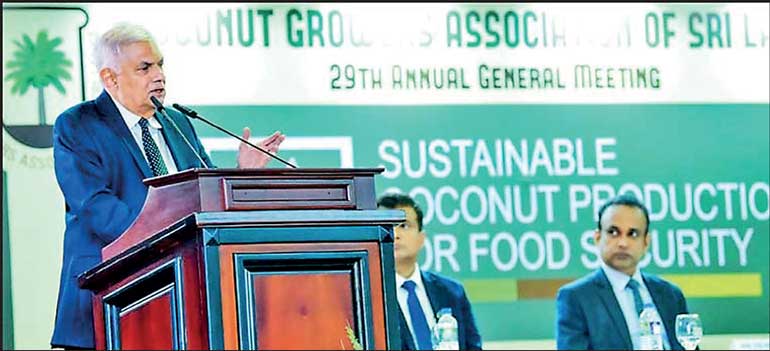
Confrontationism at coconut conclave
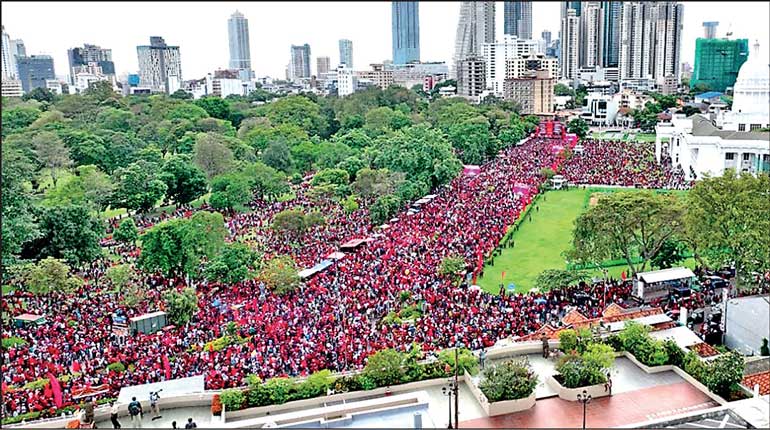
NPP-JVP: Small party?
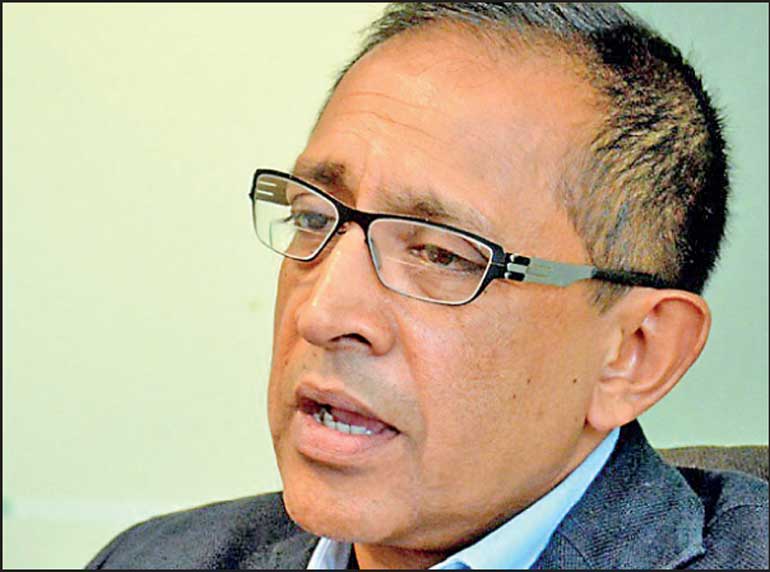
Kabir: Ranil’s or Sajith’s economist?
“…This seems an attempt to browbeat the Supreme Court, on the lines of his predecessor’s last disastrous flourish in 1983 when Government goons attacked the homes of Supreme Court judges. Their leader who claimed to be an ordinary citizen was a man called Kalu Lucky, at whose wedding the current President had signed as a witness…”
— Council for Liberal Democracy —
 Like Barbenheimer, but nowhere as brilliant, it is GotaRanil. Apart from his overweening insensitivity to the peasantry, the working people and the citizenry in general, President Wickremesinghe shares another endearing quality with his predecessor Gotabaya Rajapaksa: misplaced arrogance.
Like Barbenheimer, but nowhere as brilliant, it is GotaRanil. Apart from his overweening insensitivity to the peasantry, the working people and the citizenry in general, President Wickremesinghe shares another endearing quality with his predecessor Gotabaya Rajapaksa: misplaced arrogance.
Innocent citizens died of exploding gas cylinders on Gotabaya’s watch. Innocent citizens are dying of substandard medications on Ranil’s watch. (Dr. Chamal Sanjeewa exposes serious fraud and corruption in the Ministry of Health I Sri Lanka Latest News - Sri Lanka News Update (mawratanews.lk) Ranil’s reckless effrontery was on ample display in his recent speech to the coconut growers.
 Firstly, he trespassed – trampled, actually—on the exclusive preserve of the judiciary.
Firstly, he trespassed – trampled, actually—on the exclusive preserve of the judiciary.
 Secondly, he gratuitously insulted political parties, and one in particular.
Secondly, he gratuitously insulted political parties, and one in particular.
 Thirdly, he expressed a determination to disallow something which he has neither the right nor the capacity to touch.
Thirdly, he expressed a determination to disallow something which he has neither the right nor the capacity to touch.
The separation of powers between the executive, legislative and judiciary is the sole guarantee of checks and balances to constrain the autocratic centralisation of power and authority.
It is the judiciary that has the sole power to interpret the Constitution and the conformity of laws sought to be passed by the legislature. The judiciary is the site of supplication of the citizen against an act perceived to be violative of his/her rights. It is the judiciary and none other that determines whether or not such supplication falls within its purview. If not, the courts will rule against hearing such a petition, dismissing it.
Wickremesinghe transgressed the boundaries guarding the separation of powers in his ‘coconut’ speech. His remarks were in the context of a petition filed by the NPP-JVP and its trade unions before the Supreme Court with regard to the unilateral diminution i.e., robbery, of the life savings of public servants through downward adjustment of interest payment rates on EPF-ETF funds.
‘Sri Lanka President Ranil Wickremesinghe has said debt restructuring is matter involving public finances coming under parliament and not courts, and has called opposition groups not to disrupt the process through legal action, a statement said.
“Public finance belongs to parliament,” President Wickremesinghe was quoted as saying at a forum of coconut farmers on Friday.
“This plan has already been approved by parliament. This process will only be halted on the instructions of parliament. We cannot take orders or instructions from anyone else.”
“So, I am telling smaller parties not to create un-necessary problems.”…’
(Sri Lanka President says DDR matter for parliament, not legal action | EconomyNext)
Lethal implications
 If Ranil had strong opinions on this he should have chosen law which he majored in, as profession and placed his case before the courts, not hectored the judiciary from outside as an unelected politician.
If Ranil had strong opinions on this he should have chosen law which he majored in, as profession and placed his case before the courts, not hectored the judiciary from outside as an unelected politician.
Sri Lanka is a democratic republic. Any trespassing on the separation of powers, any encroachment by one branch upon the other, would damage the democratic character of our state.
Wickremesinghe’s confrontationist ‘coconut’ doctrine has the most menacing ramifications. The Council for Liberal Democracy nails it:
“In 1983 the then President claimed to have rolled up the electoral map for years after his referendum. The present President seems to want to follow suit, and without a referendum.”
The CLD observes acerbically though pertinently:
“…He may have forgotten that, following that proud boast, and the attempted intimidation of the Supreme Court, all hell broke loose and the Government was a lame duck for the several years that remained to it following the referendum. The present President was a leading member of that Government, and deeply involved in the hubris of 1983. Like the Bourbons, he seems to have learned nothing, and forgotten nothing about abusing the constitution…”
Ranil Wickremesinghe decided not to hold the local government elections and used the argument that the release of monies already voted for the purpose by the Parliament cannot be used due to a tight money policy (‘no printing’) agreed upon with the IMF. That argument was trotted out by the state before the Election Commission and the courts. It was also used by the EC to explain its inability to stick to its pledge to the courts of holding elections on schedule.
What is to stop him from doing the same thing next year? Ranil’s speech to the coconut growers interprets the country’s basic law, and declares certain subjects and functions out of court for the courts (pun intended). His absolutisation of the parliamentary control over public finance (including the release of funds for elections) is deployed as a firewall between his incumbency and the rigid constitutional dictates for elections—the defining factor and guarantee of the democratic character of the state.
Wickremesinghe’s argument is an assertion of arbitrary rule and personal caprice. Arbitrary rule backed by big business is a hallmark of autocracies, dictatorships and indeed of fascism.
Ranil should be advised that if he attempts to convert Sri Lanka’s democracy into arbitrary personalist rule, the citizens of Sri Lanka may arbitrarily deprive him of his present employment as they did his predecessor.
Whose party is smaller?
Who or what is President Wickremesinghe referring to as “small parties”? The JVP? Already in August 2020, the JVP with its 3% vote and 3 MPs was considerably bigger than Wickremesinghe’s UNP which had not succeeded in electing a single member to the legislature. Ranil himself was not elected to parliament while the JVP-NPP leader Anura Kumara Dissanayake was.
Today, opinion polls show the JVP-NPP much larger than Ranil’s UNP. The UNP is on 9%, while the NPP-JVP on 23% as is the SJB.
Going by parliamentary representation, the UNP is the smallest party, dwarfed even by the SLFP.
Going by opinion polls, the UNP is the second smallest of parliamentary parties, bettering only the SLFP which registers 2%.
Opinion polling also shows that JVP-NPP leader Anura Dissanayake is far more popular than Ranil Wickremesinghe. There is a far greater statistical likelihood of Anura Kumara or Sajith Premadasa being elected to the presidency next year than Ranil. More likely than not, either Anura or Sajith will be deciding on Ranil’s retirement package.
So, the UNP’s leader is hardly in a position to look askance at anyone else’s party and deem it “small”.
Wickremesinghe’s derogatory (“small parties”) remarks and warning against the JVP-NPP’s litigation is riskily intemperate. When a left party which has led two armed rebellions in 20 years, is focused on a purely electoral track and reposes faith in the judiciary to rectify social injustice, it is to be encouraged as a hugely positive sign of de-radicalization. Typically, Ranil chooses confrontation and intimidation instead. It may prove his undoing.
Old politics, new politics
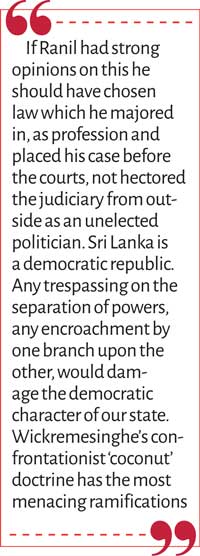 In his ‘coconut’ speech, Ranil stared sternly into the TV cameras, switched to Sinhala and declaimed that he “would not permit a reversion to the old politics”. What exactly does he mean? The old politics of having a leader elected by the people? The old politics of holding elections on schedule? The old politics of democracy?
In his ‘coconut’ speech, Ranil stared sternly into the TV cameras, switched to Sinhala and declaimed that he “would not permit a reversion to the old politics”. What exactly does he mean? The old politics of having a leader elected by the people? The old politics of holding elections on schedule? The old politics of democracy?
Wickremesinghe has no popular mandate and no legitimate right to disallow ‘old politics’, ‘new politics’, ‘not-so-old-politics, ‘not-so-new-politics’, or any brand of politics at all.
What is the opposite of the ‘old politics’? Ranil’s new politics? And what does that look like? A democratic political system of four elected tiers, two of which remain unelected—the local and provincial bodies—and the top tier is also unelected, leaving as the only elected tier a parliament with a majority which forfeited its mandate by defecting to its rival whom it was elected against?
Atop this de-legitimised and mostly unelected, unrepresentative structure, a structure voided of legitimacy and consent, Ranil is heaping a polarising IMF austerity program, an emotive enhancement of the 13th amendment and a portentous agenda of economic and physical integration with India (especially Tamil Nadu).
Though political science is not an exact or ‘hard’ science since human behaviour is involved, it is a (social) science. Going by the science, Ranil Wickremesinghe’s irrational experiment in a ‘new politics’ of a polarising, multi-layered agenda rested upon a hollowed-out political structure and a miniscule popular base, can only lead to implosive collapse or combustion.
What would N.U. say?
The Indianisation agenda of Ranil Wickremesinghe and Milinda Moragoda is set to deal a death-blow to important segments of Lankan entrepreneurs.
“Agriculture Minister Mahinda Amaraweera said that two well-known companies from India have submitted requests to invest money to commence business activities to produce chicken and eggs in the country. He said that they are currently looking into the possibility of giving these investors the opportunity to produce eggs and poultry in Sri Lanka…He also said that rather than importing eggs and poultry from foreign countries, it is more effective to give foreign investors the opportunity to start these production industries in this country…He said further that India’s Amul Company has come forward to commence the dairy industry in the country and that proposal is also being considered.” (Indian companies keen on poultry, eggs business here – Minister – DailyNews)
The answer to higher prices and outflow of funds for imported eggs, is to stimulate local output by protecting and incentivising the local poultry, dairy and animal husbandry industries, rather than permitting Indian companies to enter and crowd out the local entrepreneurs. However, the Ranil regime has put almost all its eggs in the Indianisation basket.
Milinda Moragoda’s grandfather, the iconic, irascible tycoon and conservative-patriot NU Jayawardena, debating my pro-devolution, left-liberal father Mervyn de Silva, editor of the Lanka Guardian, over lunch at Lal and Kumari Jayawardena’s, used to say that the problem of Tamil secessionism will resolve itself through evolution because the island’s demography is changing with emigration, which reduces the base for sustainable separatist or centrifugal federalist assertion.
By proliferating connectivity and creating contiguity between Tamil Nadu and Sri Lanka’s North and East, his grandson Milinda Moragoda is now working to reverse that demographic dynamic.
“The Ministry of Ports, Shipping and Aviation has decided to reconstruct the Talaimannar pier to facilitate passengers from Rameswaram, India. The move was made in a bid to further improve people-to-people ties with India, sources reported.
The pier is set to be reconstructed after 37 years, with the project having an estimated cost of Rs. 1.8 billion.
Issuing a statement in this regard, the Ministry revealed that parallel to the reconstruction of the pier, nearly 10 acres of state-owned land bordering the port will be acquired for the development of relevant infrastructure. It was also highlighted that a modern passenger terminal and a warehouse facility will also be constructed.
…Requests for proposals to carry out these developments will be called for under a private-public partnership, the Ministry noted, adding that India has completed developments at the Rameswaram Port, and clearance has been declared to commence a passenger ferry service between Mannar and Rameswaram.
Nimal Siripala de Silva visited the Talaimannar Pier for an inspection on Friday (04 August), during which he deemed the development of the pier essential for the strengthening of people-to-people ties between the two nations…” (Talaimannar pier to be reconstructed in a bid to strengthen ties with India (adaderana.lk)
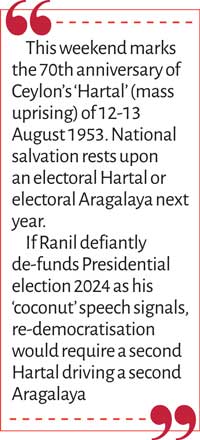
Shrinking the ‘functional distance’ between Tamil Nadu and our Northern periphery will more than offset emigration, serving as massive demographic reinforcement. ‘Connectivity’ will be ‘interconnectivity’ which re-boots Pan-Tamilianism. It is pertinent that Ranil’s top negotiator during the years of the Ceasefire Agreement (CFA) with Prabhakaran, Moragoda had no problem with the LTTE’s Interim Self-Governing Administration (ISGA) presented by Anton Balasingham during the Sattahip negotiations.
The Ranil-Modi ‘Vision’ statement and accompanying MoUs has not been submitted to, debated by and voted on in Parliament. The Ranil-Milinda ‘grand strategy’ of Indianisation constitutes an act of political piracy, a hijack and handover of this island’s destiny. It demands a Referendum.
Odd Opposition
The NPP-JVP is readying for next year’s presidential election. But it is not ready or readying for a possible ‘postponement’ (cancellation) by Ranil. For its part, the SJB is ready neither for the presidential election nor its possible non-holding.
Some SJBers say their party cannot enter an equation with Ranil while he is a prisoner of the Rajapaksas, and call for a snap parliamentary election. This implies that if he flushes out the SLPP through a parliamentary election, a re-convergence is possible. But how can the SJB enter a post-parliamentary election equation with Ranil, the incumbent president, and then run a candidate against him at the presidential election next year?
Senior member of the SJB’s Economic Policy Unit, Kabir Hashim, MP, is the prime author of an important new piece on economic policy which makes no mention of the SJB, Sajith or President Premadasa, names Ranil three times, merely reiterates his policy and endorses the next steps along the way. Judging by the article, the SJB doesn’t exist and the author could very well be a member of Ranil’s cabinet. (Sri Lanka can solve its economic crisis: Here’s how | Daily FT)
If so, why should the SJB run a candidate opposing Ranil? Why not join him? And how can one expect the average voter to notice a qualitative difference—or even a substantive difference-- between the economics of the Ranil regime and the SJB, to vote for the latter?
The SJB fails to understand that its unique selling proposition is ‘Sajith Premadasa as President’, mainly because of the credible promise that slogan holds of reviving the development-with-equity miracle of his martyred father, President Ranasinghe Premadasa. What can get the SJB, and not the UNP, to the top are Premadasa policies and the Premadasa (father and son) vote.
Meanwhile, the NPP-JVP says that 2024 will be the most important year politically since Independence, because it offers a new beginning:
(1) Displacing the old elite establishment from power, and
(2) Building a new, productive economy from bottom-up and inside-out, based upon tapping to the fullest, the island’s endowments, capacities and strengths.
It insists that Ranil “has only a year to go and simply cannot postpone next year’s presidential election because it is engraved in the Constitution”, adding blithely that “if he tries, we shall see about it at that time”.
This is mere whistling in the dark. The world over, all serious leftists know that by the time the conditions are manifestly ripe for resistance to dictatorship, it is already too late to begin to prepare for it.
This weekend marks the 70th anniversary of Ceylon’s ‘Hartal’ (mass uprising) of 12-13 August 1953. National salvation rests upon an electoral Hartal or electoral Aragalaya next year.
If Ranil defiantly de-funds Presidential election 2024 as his ‘coconut’ speech signals, re-democratisation would require a second Hartal driving a second Aragalaya.